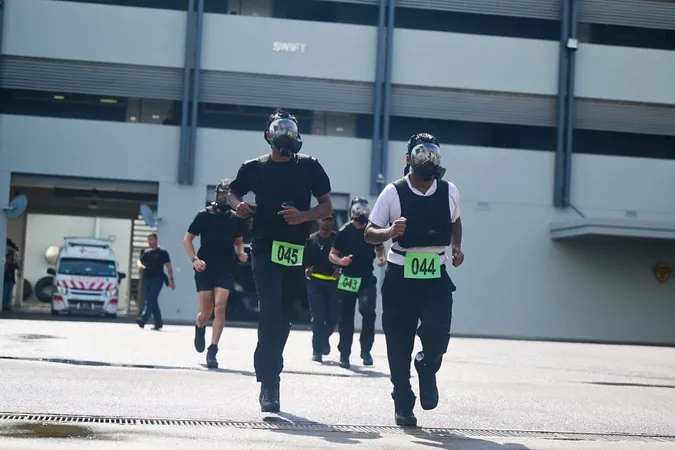
Inside the Elite Spear Unit: Only the Toughest Survive Singapore's Rigorous Selection Process
2024-10-01
Author: Wei Ling
SINGAPORE - In an intense battle of grit and resilience, potential recruits for the Singapore Prison Service's elite tactical unit, known as Spear, faced a selection test that would leave most candidates defeated. During a nearly eight-hour ordeal of stamina-draining physical and mentally challenging tasks, the odds of making it through were daunting—only one out of five candidates emerged victorious.
Spear officers play an essential role in maintaining order within Singapore's prisons. Their responsibilities include managing violent incidents, relocating aggressive inmates, and safely escorting high-risk convicts for essential purposes such as medical treatment or court appearances. Notably, these specially trained officers are also authorized to administer caning, a punishment under Singaporean law.
Currently, the Spear unit comprises around 70 officers, but that number stems from a highly selective pool. The selection process not only tests physical strength but also mental acuity, ensuring candidates can withstand the high-pressure situations they may encounter on the job.
Candidates undergo a grueling array of tests, starting with a 500m obstacle course featuring challenging elements like monkey bars and steep walls. They must also complete a 2km run while straining under a weighted vest and respirator mask, sprint a further 400m, and laboriously ascend seven flights of stairs with 15kg weights in each hand.
Cognitive abilities are assessed immediately following these taxing physical tasks, where candidates are subjected to memory challenges and psychometric assessments to gauge their awareness and judgment under stress. Teamwork is crucial; candidates must work together to maneuver a dummy simulating an injured inmate through a designated course and march 3km with weighted backpacks.
On October 1, media representatives were granted rare access to witness this competency-testing event. Among the candidates, Sergeant Fariduddin Shahruddin, 27, proved to be a standout, completing the demanding selection process. While he awaits results, the specifics regarding the minimum passing score remain undisclosed, stoking intrigue about the fierce competitiveness of the selection.
Despite being open to all officers within the Singapore Prison Service, Spear's selection events attract only a modest number of applicants—around 20 to 25 candidates per test held three times a year. The competition is fierce; only about 30% of those who attempt the selection will move on to become Spear officers.
Should Sgt Fariduddin successfully pass this initial phase, he faces an additional hurdle: a comprehensive 20-week tactical training course. Only the most qualified amongst applicants transition to this advanced stage, boasting a high passing rate of nearly 100%.
Chief Warder Toh Hengli emphasizes that the tasks are specifically crafted to mirror the realities of working in a prison environment. Physical strength and mental endurance are non-negotiable traits for these officers, as their roles demand resilience amid chaos. Spear officers typically engage in operational duties on average once every two weeks, dedicating the rest of their time to rigorous training routines.
Distinct from regular prison officers, Spear members are armed with a Tactical Electronic Distraction Device capable of unleashing a horrifying 120dB sound and blinding light to disorient inmates. Their equipment load can include protective armor and breaching gear, underscoring the intensified nature of their responsibilities.
The stakes are high; incidents of prison riots have proven lethal globally, with tragic outcomes including casualties among security personnel and inmates alike. Singapore has not been exempt from such violence—its sole recorded riot occurred at the Pulau Senang open-air prison in 1963, claiming the lives of several prison officers and leading to the execution of 18 inmates for their crimes.
Recent years have seen catastrophic riots across the globe, such as the appalling incidents in Ecuador's Penitenciaria del Litoral, where at least 68 inmates were killed in gang-related violence just last year. Echoing this chaos, Thailand experienced widespread unrest in December 2021 that left several inmates injured during a riot sparked by the mishandling of a COVID-19 outbreak.
As the world continues to grapple with prison violence, the rigorous and exemplary training of units like Spear is crucial for ensuring safety and order within the walls of correctional institutions. Audiences are left wondering: will Sgt Fariduddin join the ranks of these elite defenders of law and order, or will he become just another statistic in this ultra-competitive environment?



 Brasil (PT)
Brasil (PT)
 Canada (EN)
Canada (EN)
 Chile (ES)
Chile (ES)
 Česko (CS)
Česko (CS)
 대한민국 (KO)
대한민국 (KO)
 España (ES)
España (ES)
 France (FR)
France (FR)
 Hong Kong (EN)
Hong Kong (EN)
 Italia (IT)
Italia (IT)
 日本 (JA)
日本 (JA)
 Magyarország (HU)
Magyarország (HU)
 Norge (NO)
Norge (NO)
 Polska (PL)
Polska (PL)
 Schweiz (DE)
Schweiz (DE)
 Singapore (EN)
Singapore (EN)
 Sverige (SV)
Sverige (SV)
 Suomi (FI)
Suomi (FI)
 Türkiye (TR)
Türkiye (TR)
 الإمارات العربية المتحدة (AR)
الإمارات العربية المتحدة (AR)